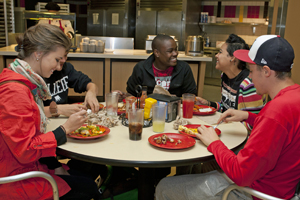Aug 6 2013
A pilot composting program will begin at MarketPointe@Siddall dining center in fall semester, and plans call for the program to eventually be used in other UC settings. The university's Office of Sustainability, Facilities Management and Food Services have been discussing a composting strategy in recent years, and a grant from the Ohio Environmental Protection Agency via the Hamilton County Solid Waste & Recycling District helped set things in motion.
 MarketPointe@Siddall will be the site of the University of Cincinnati's pilot composting program.
MarketPointe@Siddall will be the site of the University of Cincinnati's pilot composting program.
"It's an idea we've been trying to make work for three years," says Claire Sweigart, sustainability coordinator. "This grant was the push we needed to take the leap."
The pilot project's goal is to keep 100 percent of the food waste produced at MarketPointe out of the landfill. Instead, the nearly 2 tons of waste generated each week will be diverted to an off-campus composting partner. The program will keep UC near the front of nationwide sustainability trends and could serve as a template for other institutions.
"Other universities have composting programs, but it's not by any means the standard," Sweigart says. "It's still a new concept because it does take a change in mind-set and sometimes a change in facilities. This program will be a 'green' star for us."
GRANT JUMP-STARTS COMPOSTING INITIATIVE
UC received a $15,000 grant from the Ohio EPA through Hamilton County last spring. The money was used to purchase necessary capital improvements: storage carts, compostable bags and flatware, and interpretive signage. Facilities Management provided a $10,000 match to prepare a refrigeration unit to accommodate food waste storage.
MarketPointe primarily serves the 1,130 combined residents of Calhoun and Siddall halls, and the dining experience for those patrons will remain unchanged. But behind the scenes, new practices will be in place in the kitchen and dishwashing areas. Dining center employees will place all food waste – whether scraps from food preparation or uneaten items off dishes – into special storage carts lined with compostable bags, as opposed to being tossed in the trash. When filled, the bags will be stored in the updated cooler to await pickup from a compost hauler.
Compost is more than just the green-thumbed gardener's go-to soil amendment. The EPA notes that among the most important benefits of compost are its abilities to clean contaminated soil and to prevent pollution by reducing toxin formulation in landfills.
"Waste generation is a huge issue that, while maybe not as glamorous as your carbon footprint, it's definitely just as important," Sweigart says. "We have to be finding different options for our waste, especially food waste which easily can be turned in to something valuable that enriches our ecosystems."
UC COMMITTED TO GROWING THE PROGRAM
UC will monitor the MarketPointe composting program this academic year and evaluate the possibility of expanding the program to CenterCourt dining center and Stadium View Café in the future. From there, the program could be adapted for use at other Food Services-operated facilities on campus, such as Mick & Mack's Contemporary Cafe and Classic Fare Catering; at regional campuses; and throughout the entire University of Cincinnati system. Beyond UC, the program could serve as a model for other universities and institutions that operate large dining centers.
Efforts are already under way to grow sustainable initiatives in Food Services. John Hautz, director of Food Services, says biodegradable disposables and reusable takeout containers at Stadium View Café will replace Styrofoam, which can't be composted. Facilities Management will cover the ongoing cost of hauling compost. The Office of Sustainability will provide educational materials, student outreach and continuing support services.
The initiation of this composting program aligns with the UC2019 Academic Master Plan goal to create a deliberate and responsible approach to our environment and to UC's resources and operations. The university recognizes its role as a leader in sustainable practice, research and education. UC seeks to consider the environmental, social and economic impacts of its decisions and is committed to incorporating the concept of sustainability into its academic and research programs; the design, operation and maintenance of its buildings and landscapes; and its organizational structure and management.
Source: http://www.uc.edu/